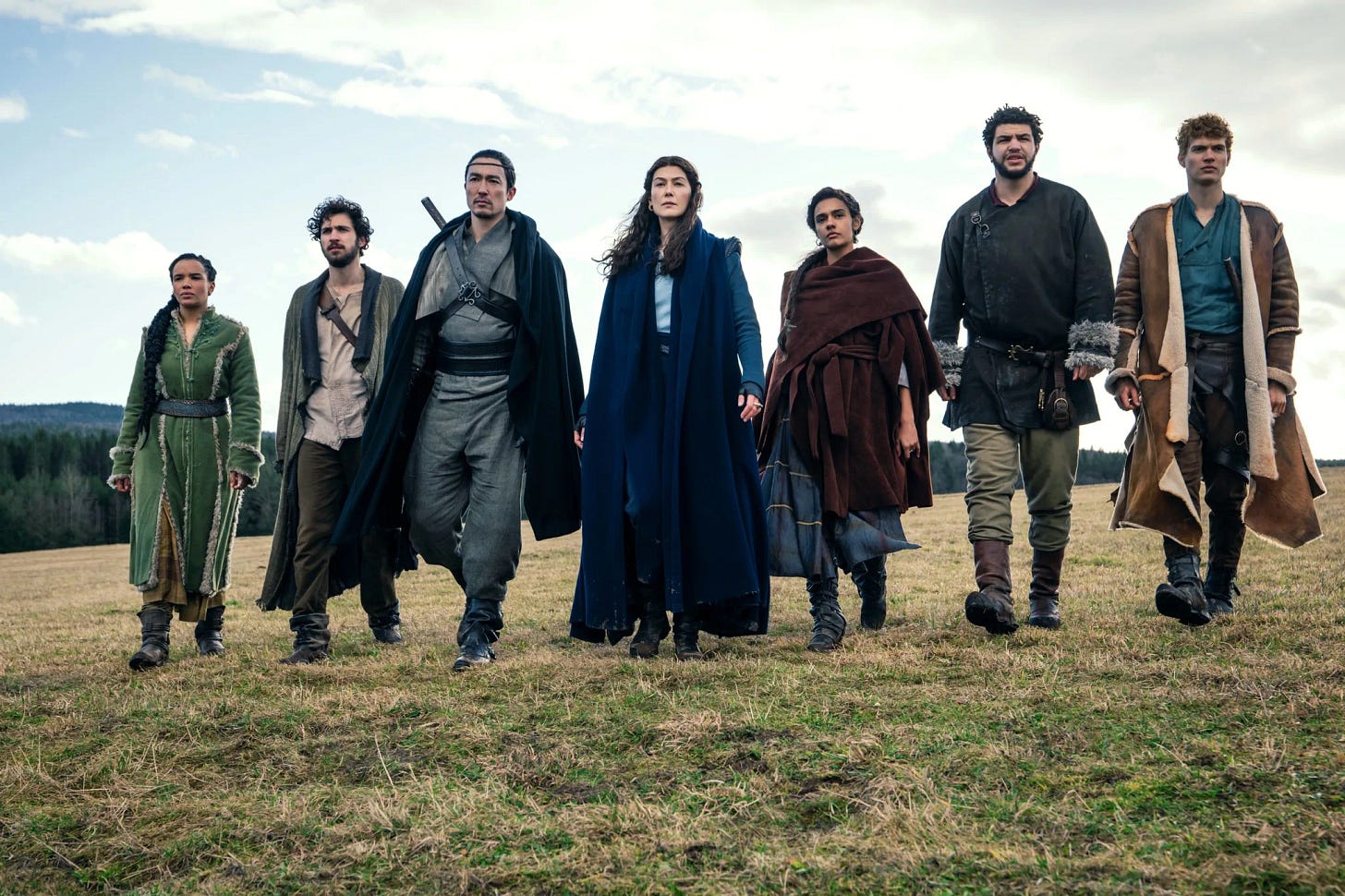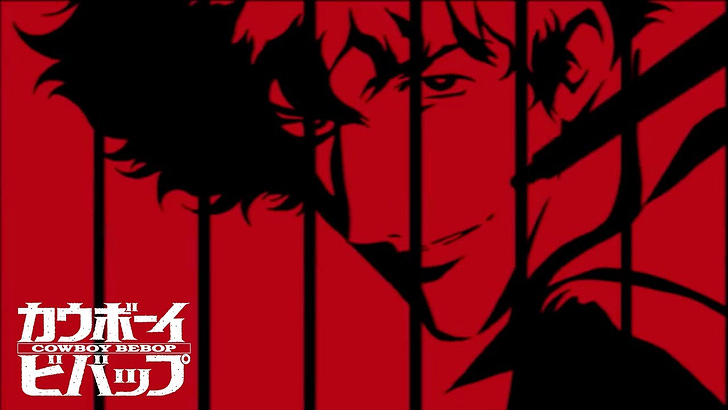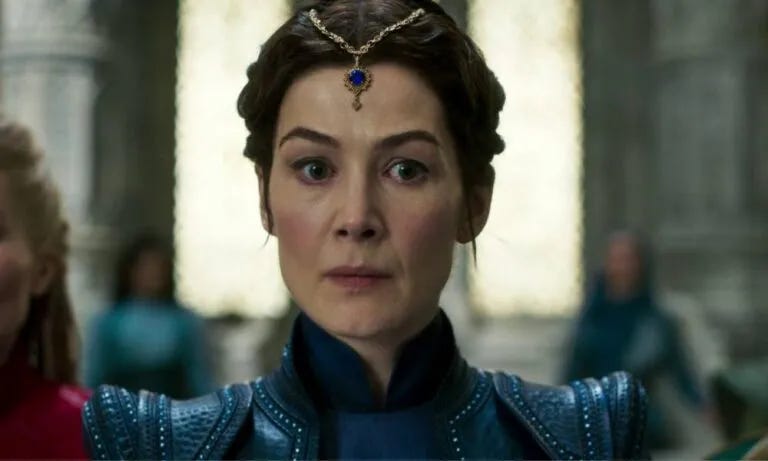An Unnecessary Preamble
You may be asking yourself, Why are you reviewing the first season of a show that finished it’s second season almost two months ago?
This is a pretty good question and I’ll answer the question with a brief story:
When I was a child I really wanted a dog so I found a stray dog and spent the day with it.
Moving on: I’ve not been feeling well lately and so I began watching this show. I finished it now and not back then because my wife showed no interest in it before and sometimes I just kind of want to play around with a dumb fantasy show.
And I am always fascinated by the process of adaptation so I was pretty curious about this show.
I wrote before about adaptation and I even wrote very specifically about the Netflix adaptation of one of the greatest anime of all time, so I’ve always meant to write about this show and the book.
I even sort of promised two years ago to write more about Robert Jordan’s Wheel of Time, but, in the time since, I’ve sort of come to terms with the fact that I said most of what I had to say about it and the rest would just be complaining.
And complaining is for suckers and losers. So says I.
The Wheel of Time is a Sitcom
Amazon’s first season of The Wheel of Time is premiering this week, so I thought I’d say something about the book series, and epic fantasy more broadly. A sense of impending doom, of unnamable horror, beset me when, in 2011, The Office released Michael Scott into the wilds of the world beyond the fictional documentary. At this point, many of us had no tr…
But since the show is now out, I may as well use it as a vehicle to discuss the rest.
Should go without saying, but spoilers for the first season of this show. None for the books, however.
A Brief Introduction
Robert Jordan’s Wheel of Time is considered, by many, to be the best epic fantasy since Tolkien. Some even dare to call it better. It’s the highest of high fantasies set in a complex and intricately developed world that feels alive and complicated with both deep and recent history to deal with, driving the plot and many conflicts forward.
In short, The Wheel of Time follows a group of rural teenagers who are believed to be the fulfillment of an ancient prophecy to defeat the Dark One (yes, that’s the antagonist’s name) using the One Power (yes, that is what magic’s called). Along the way, nations are conquered, friends and enemies die, some become lovers, and many become incredibly powerful.
The series borrows heavily (bordering on plagiarism?) from Dune and Star Wars (which also borrows heavily from Dune) but also has enough of a Tolkienesque feel to satisfy that itch.
Originally pitched as a trilogy but contracted as six books (the acquisitions editor knew Jordan had a habit of stretching), it gradually ballooned to ten with no end in sight. Robert Jordan, sadly, developed cancer and only managed to finish one more book and, as I understand it, a vast outline for the final, twelfth book.
With eleven books finished and published, Robert Jordan’s wife, an editor at Tor—Jordan’s publisher—contacted a rising star in the fantasy genre named Brandon Sanderson—who has gone on to become, perhaps, one of the most famous and bestselling writers alive—and asked him to finish the series using her late husband’s notes.
Well, the notes for that final book resulted in three more books that finally, after twenty-two years (when did A Dance with Dragons come out?), the Wheel of Time ended exactly as Robert Jordan wanted it.
Fans seemed to mostly agree.
And now, eight years later, the series was adapted for the screen by Amazon who, at the same time, spent a billion dollars to secure the rights to the Appendices of the Lord of the Rings (lol).
Rafe Judkins, best known for being a contestant on Survivor, became the showrunner.
Why him?
Well, why not him?
The Adaptation
Despite what I’ve previously written about my mislike of the book series, I was pretty interested in the adaptation (not interested enough, granted, to watch it until it had been out for two years, but, well…). For one thing, this would give people the chance to improve on some of Jordan’s worst habits and excesses.
My controversial view of the adaptability of The Wheel of Time is that it should have been pitched as a high fantasy sitcom rather than a Game of Thronesian fantasy, but my strongest view on this is that the Wheel of Time should have been adapted as a musical, like Galavant.
If you’ve never seen Galavant, you really should. It’s the best.
Before I move on from this, I just have to say that a musical adaptation of Wheel of Time is the actual right move and not just a hilarious joke. Since the One Power cannot be seen by those who cannot channel it and men cannot see the channeling of a woman and vice versa, music could be used to illustrate this power. So rather than use special effects to quantify this, just turn channeling into a song and dance routine.
And musicals are often full of comedy, which would play to the strengths of the series (it’s not often actually funny but it did try!) while also allowing the viewer to feel the anguish and storm of emotions at the bombastic operatic moments Jordan was prone to.
Each channeler could have a little musical motif used as a shorthand when they’re doing rather basic magic that doesn’t require a whole setpiece.
This could especially be used to dramatic effect with Rand al’Thor’s internal conflict and the potential for madness among male channelers.
ANYWAY
They chose to go the more expected route and, to put it bluntly: It’s pretty all right!
I like it well enough to keep on watching, anyrate.
The adaptation is very different from the books, which is both good and bad. But I find the decisions very interesting for a number of reasons, which is the real point of this essay. The biggest difference is pacing, which is both a positive and a negative but comes down to something I find very depressing about modern screenwriting.
While I knew this was never going to actually be a music series, I do think it would be improved by being more like Xena: Warrior Princess than like Game of Thrones. I mean, yes, I appreciate the money involved here. I’m glad they had that kind of spend for each episode.
But I think a 20 episode structure would have helped a great deal here for reasons that are somewhat unique to The Wheel of Time.
Perhaps the kindest thing I can say about Robert Jordan’s sense of pacing is that it’s lackadaisical. He was never one to let a single sentence do when he could make it a whole page, and he was never in a hurry to get anywhere with his characters or his story, despite publishing it at a pretty aggressive pace, considering the size of these books.
It’s been several years since I’ve read The Wheel of Time but I remember the first book sort of split up like this:
150 pages spent at the Two Rivers
Maybe another hundred pages running from the bad guys until they reach Shadar Logoth, where they split up and Mat gets that cursed dagger
Another 150 pages with the group split up, where Mat, Rand, and Thom do gleeman stuff and Perrin and Egwene meet the Tuatha'an and hangout for a long time
They’re reunited at Caemlyn and Rand meets Elayne, the heir to the throne. He also meets Loial, the Ogier. This is maybe another 100 pages
The rest of the book is their journey to the Eye of the World where the novel ends with a great magical battle, sealing the Dark One away.
That’s a close enough breakdown, anyway.
But the TV show is just burning through plot. Where the book takes its time to settle the reader into the world and the characters, the show continually leaps forward to the next climactic event. It does this so much that it actually manages to pull plots that won’t arrive or resolve for at least one more book and just jams them into a single episode.
We also, interestingly, go straight to Tar Valon, the seat of the Aes Sedai, and become enmeshed in the politics there (for an episode), which is something that doesn’t happen until book two (and only for specific characters). This skips Caemlyn and Elayne, who I imagine is coming in the next season, since she’s one of the most important characters still unmentioned in the show.
The show never settles into itself, which leads to a sort of frenetic quality. This also makes it difficult to tell how much time has passed, which affects our understanding of the shape of this world and how large things are.
I know that Rafe Judkins fought for more episodes but lost this fight, so I understand that time was tight and renewal was not guaranteed. Amazon was betting big on Rings of Power (lol), which seemed like more of a guaranteed hit, whereas the Wheel of Time was an untapped franchise with a potential high upside but also the potential for a quick and expensive failure.
Of course, by limiting how much screentime the show was given they made the adaptation’s success more precarious.
It’s difficult to build an entire fantasy world when you’re not given the time.
Of course, the Lord of the Rings trilogy only had about an extra 90 minutes on this first season of the Wheel of Time, so what’s the trouble?
Which is a good comparison to use.
Eight hours was enough time, probably. But they needed to slow things down considerably.
I’ve described the Wheel of Time as One Giant Book rather than a series of discrete books, which leads to many weird problems, for me as a reader. But now that this is being adapted into a series, I think the showrunners and producers need to stop thinking of each season corresponding to each book. They’re clearly thinking this way a bit, but in the opposite direction. They are sprinting forward at an alarming rate.
The Fellowship of the Ring’s plot is pretty brief, honestly, and Peter Jackson used every minute of those three hours to build the world and our affection and understanding for the characters. It never felt rushed or like we missed something. Rather, we had a lot of time in the Shire to come to know the hobbits before they went adventuring. And even once the adventure begins, the movie remains always focused on the characters and their own goals and relationships.
And since the Wheel of Time is such a sprawling, lethargically paced story, they could have used all eight hours to do just that.
Let us come to know the characters. Sure, put them in peril here and there, but not every episode. Allow us to see them, to know them when their lives aren’t on the line.
There’s a lack of confidence in the show, like it needs to continually remind us that danger lurks everywhere, that something exciting is just about to happen. There’s a brooding, dark quality to it all that’s a bit at odds with the source material.
Which is, in theory, fine. I think the show would’ve done better if it were more YA than adult, with the first season being a bit more episodic, like Xena, where we come to intimately know all these people, this world.
Making the show more adult isn’t a bad idea (though I think it will create possibly disastrous tensions between the source material and fans and the show).
I just wish it had the confidence to let the characters stand up and meet us.
This leads me to my big gripe with a lot of modern screenwriting.
The success of Game of Thrones broke TV, sadly. Everyone is so desperate to Red Wedding their way to Prestige TV that they ignore all the work that went into those early seasons of Game of Thrones to make you understand the world, the stakes, and care about the people involved.
Ned Stark losing his head only matters because we spend 10 hours with him, never doubting that he’ll be there at the final episode of the show, several seasons hence.
And so writers continually throw characters into danger rather than allowing interpersonal drama to drive conflict. And even when interpersonal drama happens, it’s usually driven by some new horror or disaster, so people are under extreme distress and acting out.
But, I mean, we’ve all seen a movie adaptation of Jane Austen’s books.
The drama’s all there.
And no one even has a sword.
The Good
All these changes are potential strengths.
Not the pacing. That’s just poorly done.
But by aging up the cast, for example, and making their relationships more complicated is a good thing.
In the books, they’re lifelong friends who have to essentially stop talking and trusting one another in later books for the plot to work, which is, in a word, dumb. It’s really my least favorite trope, because so much of the entire series would be resolved if these lifelong friends would just speak with one another.
But baking rifts into their relationships right away allows for them to naturally go their own ways when the plot will demand it in the coming seasons. I mean, by the end of this first season, we’re already seeing this happen.
I’m sure it’s somewhat controversial, too, but I think it’s a minor stroke of genius to give Perrin a wife that he kills in the first episode.
Many Wheel of Time fans hate Perrin but he was one of my favorites (I always hated Mat who everyone seems to love). Possibly because I’m also a big dummy who loves deeply, who spends too much time brooding.
I think we’re given a powerful reason for Perrin’s internal conflict which will drive his character for the rest of the show. Yes, it’s a shorthand and one that’s gone out of fashion, but I think it’s an effective shorthand.
Bringing in the conflict between the Aes Sedai and the Whitecloaks right away is another good enough idea. Bringing us straight to the Aes Sedai is also possibly a great idea. Rather than keep them at the periphery for a time, we’re now fully cognizant of the factions within the White Tower and how the White Tower relates to the rest of the world.
I even think the relationship between Moiraine and Siuane is interesting and has a lot of potential (I’ve always had issues with Moiraine’s eventual relationship). Also, showing their deep connection upfront and what their plan truly was gives us some insight that will drive dramatic tension in the Tower for several seasons.
I mean, I wish we spent more time with all of this, but I like the way they’re setting things in motion. Yes, they raced through a lot of plot to get here but concision is often a good thing, especially when dealing with a series like this.
I’m also impressed by the restraint the show has with regard to its worldbuilding. I mean, I’ve read fourteen books so I was unlikely to be confused an hour in, but I think the show doles out information at the right pace. When we need to know something, it’s handed to us. Sometimes it’s handed to us in a sort of incidental way, which is the kind of worldbuilding I like.
Along with all these changes, the show looks great.
I love the Aes Sedai costuming. Rosamund Pike seemed like a strange person to headline this show but then I saw her standing there in blue and was just like, Hell yeah.
I even love the casting of Logain and that we got to see, upfront, the power of a male channeler, and why they are so feared and hated, but also beloved and seen as a banner of hope against the tyranny of the Aes Sedai lording over the world in their White Tower.
We get to see, viscerally, a conflict between populists and the ivory tower types, who plot and weave and control the lives of so very many who never agreed to such a concentration of power.
Again, I wish this was given more time, but it is what it is. And, ideally, we’ll have several seasons to explore this in greater detail and depth.
And now, with all that said, I’ll move onto the bad, which I’ll save for paying subscribers.
For the rest of you, just know that the series is worth giving a chance. Watch the first episode. If you like it, watch until you don’t.
The Bad
Keep reading with a 7-day free trial
Subscribe to Wolf to keep reading this post and get 7 days of free access to the full post archives.







